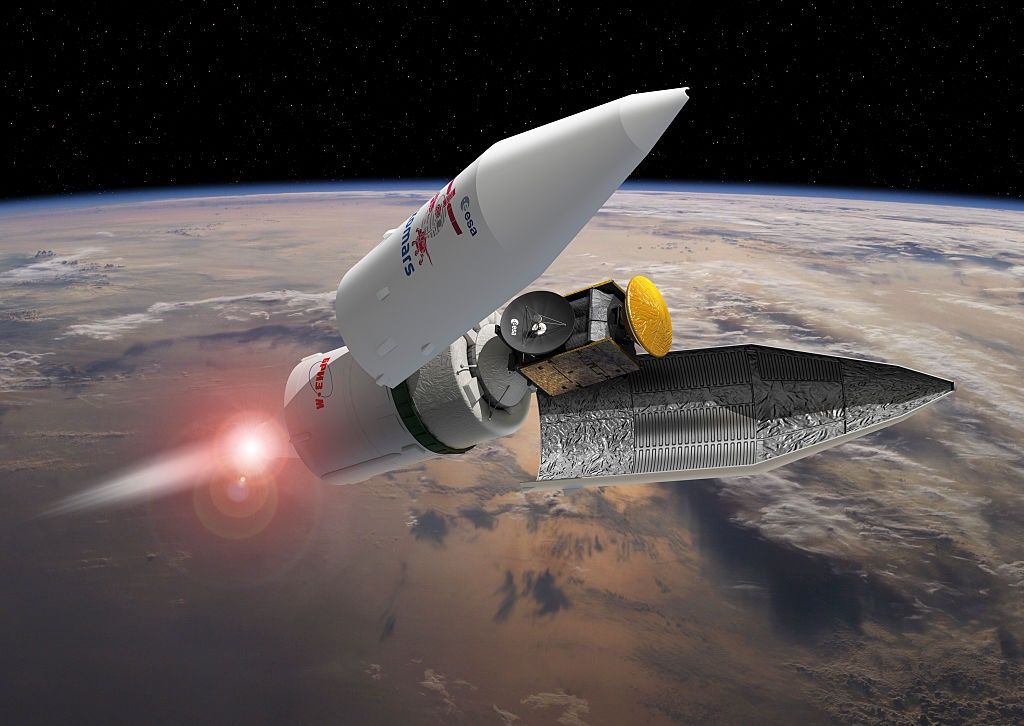
European Space Agency (ESA) controllers lost contact with the Schiaparelli Mars lander last week. It appears that the entry, descent, and landing sequence didn't go as expected, with failures related to the timing of the parachute and the retro-rockets driving Schiaparelli into the surface of Mars. It probably didn't survive.
That's what many of us speculate, although ESA has been appropriately circumspect in talking about the condition of the lander. Still, that unfortunate end to an otherwise successful mission is what seems likely.
Let's remember that Schiaparelli was primarily meant to test European landing technologies, with science as a secondary objective. Recording the data during the descent has already achieved a lot of the mission's goals. The 600 megabytes of data that Schiaparelli sent us before it lost contact contains within it clues to how ESA can improve its Entry, Descent and Landing (EDL) systems for next time.
This data matters because of several major technical roadblocks for future attempts to put humans on Mars, all of which can be overcome with enough investment in space technologies. Chief among those is the need for EDL technology to put ten-to-20 metric tons on the surface of Mars at once.
NASA has been working hard on these technologies in recent years—since 2010, when the agency returned to its innovation roots and revitalized its advanced-technology enterprise. To the extent that SpaceX has solved this and other technical obstacles, or worked around them, they stand a chance of doing even better than NASA's 2030s timeline, possibly achieving their 2026 objective. Maybe colonists from the Mars One project will join them.
The better we understand the Martian atmosphere, the better engineers can predict the performance of these EDL systems. Schiaparelli's data can play a role here, as NASA's 2012 MEDLI data already has.
Space is hard. Specifically, robotic space exploration relies on engineers' ability to see the future. And that's especially hard. Some would say impossible, but prediction is an engineer's sixth sense, as imperfect and cloudy as that vision may be.
I'll contrast predicting the future with skepticism, which of course has its place in the pursuit of truth, in the scientific method. But engineering is not science. To paraphrase Theodore von Karman, scientists discover the world that is, and engineers create the world that has never been. A skeptic will never plan to colonize Mars, and mere incrementalism won't invent the paradigm shift we'll need to become a spacefaring species. That's why gutsy engineers like the ones who created Schiaparelli, Curiosity, Phoenix, Pathfinder, and so many other spacecraft will be the ones to lead us to the future.
When we arrive on Mars, we'll do some science, sure. We'll also write novels, paint, or sculpt. Some will play. Others will explore, invent. A few will start businesses or become the political leaders of a nascent Mars community. In my opinion, imagining Mars exploration to be merely the culmination of decades of scientific inquiry, finally getting that missing data point on atmospheric volatiles or the ideal soil sample, misses the larger point: the more democratic nature of exploration, its broader appeal. By recognizing the human drama of spaceflight and the human enthusiasm for a future in which we can experience Mars, we can make it clear that these pursuits are more than science projects. They're for all of us.
And Mars exploration needs us. We are problem solvers. The engineer in every one of us can recover from a technical failure, repair a broken communications subsystem, or work around virtually any problem in a way that robotic spacecraft simply cannot. That's why exploring Mars will be all the better, all the more robust, when people are there to make it work. You can't joystick a Mars rover from Earth. Instead, ingenuity and adaptability will make possible what Schiaparelli's operators simply couldn't achieve.
This principle isn't new. The Apollo 13 mission is a famous example of creative problem solving—using the resources at hand to recover from a devastating explosion of the oxygen tanks and return safely to Earth. Less famously, during an attempt to repair Intelsat 603, the Space Shuttle crew of STS-49 abandoned an unsuccessful grappling mechanism and just grabbed the satellite with their hands. NASA's astronauts on ISS still improvise all the time, despite the carefully planned and scripted nature of the tasks they undertake.
JPL's Curiosity rover and the India Space Research Organization's Mars Orbiter Mission have been great successes, despite the fact that the designs relied heavily on technologies being tested for the first time. And success is largely independent of cost. In fact, ISRO is the first space agency to launch a successful mission to Mars on its first attempt, and they did it for about $73 million. They were successful because engineers lined up the shot and took it.
What we conceive, design, and build is engineering, not science. In its purest form, engineering is exploration. It's taking those giant leaps. In the form of Mars exploration, it expresses the aspiration, even the optimism, of humankind.
We'll be on Mars soon. Maybe a decade from now, maybe two. Despite looking through a glass darkly, engineering will guide us there.
Mason Peck, associate professor at Cornell University and former NASA chief technologist.
Uncommon Knowledge
Newsweek is committed to challenging conventional wisdom and finding connections in the search for common ground.
Newsweek is committed to challenging conventional wisdom and finding connections in the search for common ground.
About the writer
To read how Newsweek uses AI as a newsroom tool, Click here.








